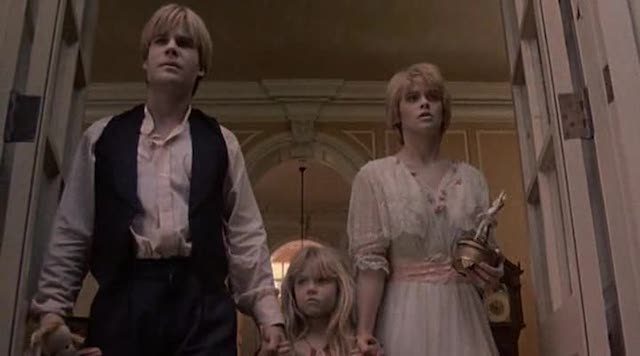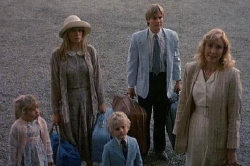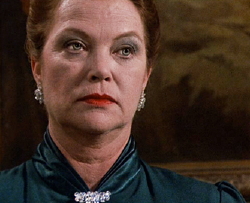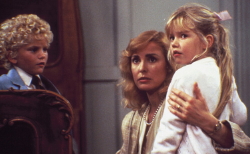
There was once a very popular young-adult novel called “Flowers in the Attic,” about a teenage brother and sister who get locked in their evil grandmother’s attic for three years and have sex. There’s more to the story than that, but the sex kind of overshadows it, or at least it did when all the girls in my middle school were talking about it. Their excitement is understandable. Fans of attic-based incest are an under-served market in popular fiction.
Naturally, a story like this would need to be turned into a film, and naturally the film would need to omit the part of the story that made it noteworthy. So the 1987 movie “Flowers in the Attic” does away with the sex but keeps hinting luridly at the idea that it might happen. The brother talks to his sister while she’s in the bathtub, the two of them innocently share a bed, they watch each other change clothes, and so forth. It’s “Flowers in the Attic,” y’all! There’s gonna be some controversial taboo-bustin’!
As it turns out, the only controversial thing about this movie is the filmmaker’s experimental use of untested boredom-creation devices, which caused audiences to endure disinterest and ennui far beyond the government-approved limits. (These same restrictions are the reason Lars von Trier can’t make movies in the United States.) As punishment from his crime, writer-director Jeffrey Bloom was forced to read the other books in the series.

“Flowers in the Attic” is about a very blond family consisting of parents Christopher and Corrine, teenage children Chris and Cathy, and young twins Carrie and Cory. Apart from the obscene alliteration of their names, they are a happy and normal family. But then terrible things occur! First, the dad dies. And on his birthday, no less. It is very sad for your family when you die on your birthday, though it does simplify things for the tombstone engraver. His blond widow and four blond children are heartbroken, and blond.
The mom, Corrine (Victoria Tennant), doesn’t know what to do. Without a husband, she has no way of supporting her family. Well, short of getting a job, I mean, but apparently that’s not an option, because the movie never once mentions the possibility of it. This is why women are always so sad when their husbands die, because they know that they are going to starve to death now.
https://www.youtube.com/watch?v=kKt8HHbgfiY
Fortunately, Corrine is resourceful, if by “resourceful” we mean “the daughter of rich people.” Her parents disowned her when she married Christopher, probably because they knew that someone named Corrine marrying someone named Christopher greatly increased the chances of all the grandchildren having the same first initial. (This is a common birth defect.) Corrine hasn’t spoken to mom and dad since then, but now that the hated Christopher is gone, perhaps she can worm her way back into her father’s heart before he dies and get back into the will. “I’ll be the heiress to a fortune beyond your imaginations!” she tells her kids, having learned English from Victorian novels.
So Corrine and the children take a train to Foxworth Hall, where dying grandpa and mean grandma live, richer than crap. Grandmother is played by Louise Fletcher, who’s best known for her chilling, Oscar-winning turn as Nurse Ratched in “One Flew Over the Cuckoo’s Nest.” That’s how she got this role, of course. “Hey, who’s a stone-cold scary woman?” Jeffrey Bloom asked his producers. “One who really, really needs a job, I mean. Is the lady who played the Wicked Witch of the West still alive? What about the one from ‘Mommie Dearest’? No, not Joan Crawford, the one who played her. Faye Dunaway. Or hey, sure, Joan Crawford, why not? Dead? Eh, just get Nurse Ratched.”

Dressed in black, with her hair yanked into a severe bun, Grandmother carries a Bible with her everywhere, I guess so she doesn’t lose it. You know how slippery those things are. First thing Grandmother does when the grandchildren arrive is lock them in the attic and threaten them with eternal damnation. “God will see whatever evil you do behind my back, and he will punish you for it,” Grandmother says, factually but perhaps impolitely. She explains that the reason she’s hung up on this “sin” thing, and the reason she hates her grandchildren, is that their dead father was their mother’s uncle. That’s why their marriage was frowned upon. You are not supposed to marry your uncle, I don’t care how rich you are, unless you are so rich that you are in the British royal family. Corrine was disowned, and all her children are presumed to be hell-spawned incest-beasts. They can stay here now while Corrine does her penance, but they have to keep quiet and stay in the attic, with all the other hell-spawned incest-beasts.
There are only two beds in the attic, and Grandmother says the children must sleep separated by gender, which means the adorable li’l twins, Cory and Carrie, can’t share a bed. This actually seems like a sensible policy, given the family’s history. I mean, Grandmother is awful, don’t get me wrong. I’m just saying I can see where she’s coming from on this one.
With the four kids locked in the attic, Corrine goes to see her decrepit and bedridden father. The old vulture’s first item of business is to instruct Corinne to remove her blouse so that her mother can whip her naked back. She gets 17 lashes, one for every year of marriage to her husband-uncle. Then she’s supposed to go upstairs and show the children the wounds, so they’ll know how cruel and insane their grandparents are. Yikes! Over the cuckoo’s nest and through the woods to grandmother’s house we go!

And that’s the scenario. Corrine has moved in with her religious-psycho mother and dying father in order to make them like her again. I don’t know what she’s doing, exactly, to achieve this. Rubbing their feet? Running errands? Mowing the lawn? While she’s doing whatever she’s doing, her children are locked in the attic, unable to leave. Someone brings them a little food every day. To be fair, this attic is bigger than my apartment, and no one ever brings food to me. Then again, I’m allowed to leave my apartment. Then again, I never do. The point is, you don’t hear me complaining.
After a while, Corrine stops coming to visit the kids every day, and Grandmother stops bringing them food. Li’l Cory gets deathly ill from malnourishment and overblondness, so Chris — who wants to be a doctor when he grows up — cuts his own arm and feeds his little brother some of his blood. Chris probably learned this technique from the humanitarian group Vampires Without Borders. When food does start appearing again, it has arsenic in it, and it kills li’l Cory, as is the tendency of arsenic. In a normal movie, this would be sad. But this movie is so icky and weird and listless that you think Cory is kind of lucky. He ate a cookie, and he’s not in the attic anymore. That’s a win-win.
I think the movie ends differently from the book, unless the book also ends with me getting bored and turning off the DVD player.
— Film.com





